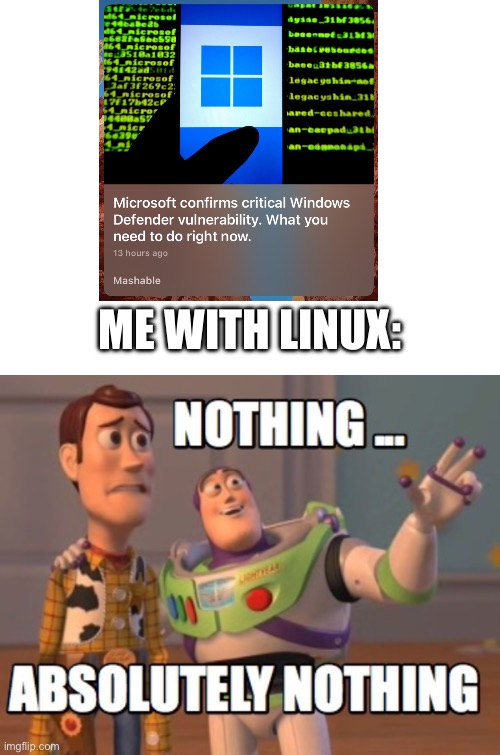this post was submitted on 17 Dec 2024
385 points (85.6% liked)
linuxmemes
27742 readers
1257 users here now
Hint: :q!
Sister communities:
Community rules (click to expand)
1. Follow the site-wide rules
- Instance-wide TOS: https://legal.lemmy.world/tos/
- Lemmy code of conduct: https://join-lemmy.org/docs/code_of_conduct.html
2. Be civil
- Understand the difference between a joke and an insult.
- Do not harrass or attack users for any reason. This includes using blanket terms, like "every user of thing".
- Don't get baited into back-and-forth insults. We are not animals.
- Leave remarks of "peasantry" to the PCMR community. If you dislike an OS/service/application, attack the thing you dislike, not the individuals who use it. Some people may not have a choice.
- Bigotry will not be tolerated.
3. Post Linux-related content
- Including Unix and BSD.
- Non-Linux content is acceptable as long as it makes a reference to Linux. For example, the poorly made mockery of
sudoin Windows. - No porn, no politics, no trolling or ragebaiting.
4. No recent reposts
- Everybody uses Arch btw, can't quit Vim, <loves/tolerates/hates> systemd, and wants to interject for a moment. You can stop now.
5. 🇬🇧 Language/язык/Sprache
- This is primarily an English-speaking community. 🇬🇧🇦🇺🇺🇸
- Comments written in other languages are allowed.
- The substance of a post should be comprehensible for people who only speak English.
- Titles and post bodies written in other languages will be allowed, but only as long as the above rule is observed.
6. (NEW!) Regarding public figures
We all have our opinions, and certain public figures can be divisive. Keep in mind that this is a community for memes and light-hearted fun, not for airing grievances or leveling accusations. - Keep discussions polite and free of disparagement.
- We are never in possession of all of the facts. Defamatory comments will not be tolerated.
- Discussions that get too heated will be locked and offending comments removed.
Please report posts and comments that break these rules!
Important: never execute code or follow advice that you don't understand or can't verify, especially here. The word of the day is credibility. This is a meme community -- even the most helpful comments might just be shitposts that can damage your system. Be aware, be smart, don't remove France.
founded 2 years ago
MODERATORS
you are viewing a single comment's thread
view the rest of the comments
view the rest of the comments

You’re holding onto a long-standing misconception: Linux is not inherently more secure than Windows. In fact, the opposite can be true.
The reason Linux seems safer is because it has a much smaller market share. Attackers don’t build massive botnets to target misconfigured Linux systems the way they do for Windows. But that’s not security—that’s just security through obscurity, which doesn’t hold up if someone is targeting you specifically.
Let me clarify my earlier point about “a link for you to click.” If an attacker is specifically targeting someone using Linux, they’re not any better protected than someone on Windows. At that point, it comes down to how well the user understands and secures their system.
The key difference? Windows actively warns you about misconfigurations that open you up to attack. For example, try enabling Remote Desktop Protocol—Windows will warn you repeatedly about the risks. Linux, on the other hand, won’t stop you. You can misconfigure SSH, open ports, or skip updates without a single warning. If someone’s after you and you’ve made a mistake? You’re toast.
Linux is powerful, but it doesn’t hold your hand the way Windows does. If you think it’s inherently secure, you’re just relying on the fact that fewer bots are looking for you—not that the system itself is protecting you.
Linux can be configured to have much better security, even by someone knowing a little about computers due to its open-source nature. And it is especially true to my case, since i'm an IT student Can you change to a hardened kernel on Windows? I use Helios kernel even on my android, which is designed to be more secure than the stock one. And there are distros which come preconfigured for security. Not much skill is needed to have a secure Linux system. But you can be a highly proficient sysadmin on Windows, but you will still depend on a few thousand Microsoft employees to fix your system. On Linux, there are millions of people and various corporations are actively working to make it secure, and even you could, if you are really highly skilled. For someone who doesn't know what a pendrive is, yes, Windows might be more secure than something like Ubuntu or any basic distro (and they propably can't use anything more advanced and secure by design).
But it doesn't take much skill to choose a highly secure linux distro, like Bazzite, Garuda, or even Qubes and use it, or maybe even harden your own. Android, which is also based on Linux is not secure by default, but in the hands of the right person, it can be a suprisingly secure system